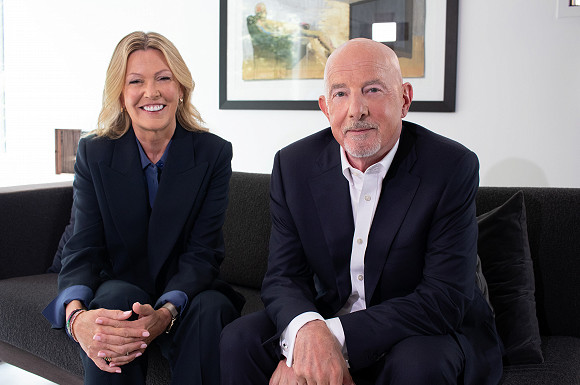26/10/2022
Dr. Ewan Kirk on Monocle 24: The Entrepreneurs – “There’s an excitement to being on the edge of failure”

Our founder, Dr. Ewan Kirk, talks to the Monocle podcast about his career and philosophy in business and philanthropy.
The episode, hosted by Tom Edwards, follows Ewan’s journey from a PhD student to an entrepreneur in finance, and to his calling to philanthropy. They discuss why making mistakes and being proven wrong is healthy in business, Ewan’s frustration with the level of wasted talent in academia, and how a STEM background sets people up for a career of experimentation and innovation.
The Monocle 24: The Entrepreneurs podcast publishes episodes weekly exploring the stories of the most inspiring people, companies, and ideas in global business. They cover a range of industries, as well as everything from newly started companies to the most established.
Edwards: You're listening to Eureka on Monocle 24, brought to you by the team behind The Entrepreneurs. I'm Tom Edwards.
Dr. Ewan Kirk is a former leader in finance, turned technology entrepreneur, perhaps best known for founding Cantab Capital Partners, a science-driven investment management firm. Kirk was previously partner and head of Quantitative Strategies Group at Goldman Sachs.
There, he led the firm's 120-strong European team of mathematicians, scientists, and statisticians. He also served as director of innovation at Scientific Generics and founded micro draft CAD software developers, Dalek. As well as that wealth of experience, Kirk is a passionate advocate for commercialising and leveraging technology and science research in business, in philanthropy, and in academia.
When it comes to formative entrepreneurial experiences, Kirk has an interesting take and certainly a unique approach to research innovation, actively encouraging those undertaking research to fail in order to foster a culture of healthy experimentation. Here is Ewan Kirk with more about his approach to investment and to business.
Ewan Kirk: Generally, of course, we have these visions of traders with their braces, the billions kind of trader, you know, trading on gut instinct. I can't do that. I know that if I make financial decisions from my gut, then I'm right about 50% of the time as we all would be. So, you know, I knew that one of the things I can do is not necessarily- I'm probably not the best modeler in the world, and I'm not the best programmer in the world, as my CTO often reminded me, but I'm quite good at building teams of mathematicians and statisticians and computer scientists. And what I thought was if we get super smart people and give them cutting edge technology and point them at super hard problems, there's probably a better chance of success.
And that's all you want. You just want a better chance. You know, there's no guarantee. So there's a number of firms, probably more concentrated in Europe than in the US, who do this or who did this type of systematic trading. And we are all a little community and we're all geeky to a greater or a lesser extent, but the geeky people are my people so I'm quite happy to be a member of that club.
I wasn't born a mathematician and wasn't born an entrepreneur. I'd had certain skills, I was a bit geeky as a small boy, and so that sort of pushes you into the science thing and pushes you through a degree. And then in my case of PhD and so on, but then I had to kind of learn to be an entrepreneur because you're not born that way.
And I was lucky to be at Goldman Sachs, which surprisingly for an investment bank, certainly when it was a partnership, was an incredibly entrepreneurial environment. There was you and a team of 50, 60 people with a partner running that part of the business, and they basically ran it and owned that part of the business.
And so, it was like lots of little entrepreneurial enterprises. So that's something that is possible to teach and possible to learn. My little aphorism here is it's a lot easier to teach a mathematician to be an entrepreneur than it is to teach an entrepreneur to be a mathematician. That's a hard job.
When I retired from Goldman Sachs and I took a year off, I sort of sat down and thought, “What do I want to do?” And there were lots of things I wanted to do and didn't want to do. Like, for example, I didn't want to commute. I didn't want to hire assholes. Those were sort of non-negotiable. But one of the things was to do something on the edge of failure.
Because things that are on the edge of failure are hard. They're difficult. There's an excitement to that being on the edge of failure, and I think it is- if you take research as smart people and you give them hard problems, it should be the case that sometimes they fail. Sometimes, I do remember Cantab, somebody went away and well, they came to me and said, “I've got this great idea to change all of our software infrastructure so it'll be a hundred times faster.”
And I said, “There you go Phil. Go do it, man.” And nine months later he came back and said, “Meh, it didn't work,” and I went, “Okay, well that's great. I mean, good. We've learned that, so let's not do that again. Let's do something else.” And that tolerance of things not working… Now, that doesn't mean that you've got a tolerance for people pushing crappy code or not caring. That's not the failure that we want. It's people trying hard and sometimes failing and, of course, because it's a hard problem, if they succeed, then it's really valuable.
There's a number of things that you have to get right. If you're running a firm, one of the things that I kind of learned early on is you speak with a louder voice in a sense, right? Whatever you say is important to people, and so you've got to think very, very carefully about what it is you actually say because it can be taken the wrong way.
We tried as much as possible to have a really flat structure. So, I did my own research. I did my own programming. When we presented research, it's always a little bit humbling when some 25-year-old says to you, “Actually, boss, that's shit,” and you've got to be okay with that. One of my employees came to me and she said, “I think we should be doing systematic trading on credit derivatives.”
I had actually worked on credit derivatives when I was at Goldman, and I said, “Linda, I'm not sure if this is a good idea.” And she said, “Well, I'm just gonna go and do it anyway.” And nine months later comes back with a complete set of strategies, all of which were brilliant and implementable. And I go, “Well, you're right. And I’m wrong. And that's great. Okay, that's fine.”
So, you've got to give people a little bit of that space. I think it does come to some degree with STEM backgrounds maybe that you sort of learn to try things out. You're doing a mathematical proof, you're never really sure where you're going. You’re sort of trying different avenues and then that didn't work. And then at some point you hit the right thing and you get to the end of point. That's sort of baked in.
I don't want the brightest and the best to go into industry or commerce. I want the second brightest and the second best to go into industry and commerce because the brightest and the best should be at the forefront of being academics and being professors and winning fields medals and Nobel prizes, because that's what they're good at.
Because of the design of the university system, and this is not just specific to the UK, it turns out that there's this enormous amount of exhaust gases that come out of universities. The people who do a PhD but don't get to do a post-doc. Now, that doesn't mean that they're not brilliant, it just means they didn't get to do a post-doc or they're not right at the peak. You know, if you think of how many people we shove into the system as first years, there's only gonna be maybe one of them that gets to be a lecturer, so everyone else comes out of the system. But that doesn't mean that necessarily that's a bad system. You know, there's something very valuable about a bright person spending three years researching one thing, which is a PhD.
I mean, that's something that you very rarely get a chance to do. How do we get more people into this? It's a government size problem. It's not a philanthropy size problem. It's not even commerce size problem, and it's a generational problem. You know, there's no magic switch which, somewhere in the Department of Education, you just pull this big lever and you produce more graduates in STEM.
You have to have that push from an early stage. There are a lot of potential people, that we talk about there being a war for talent, but the university system, particularly in the UK, produces a lot of really smart people.
This is a truism for anyone who has been successful in certain fields, that a lot of it is being in the right place at the right time. So, I just happened to be at the age where I could scrape together £49.99 to buy as ZX81 and solder it up and you know, if it'd been earlier than that, then a computer would've been the size of my bedroom and cost a hundred million pounds, so I wouldn't have been able to do that.
A lot of it is about being at the right place at the right time, but the magic of technology is it's always changing. So, I'm sure there's some young man or woman in their bedroom with their laptop programming up something just utterly amazing right now. Because the vistas are much larger. As the technology gets better, the things that you can do get better.
20 years before it would've been impossible to do what we did at Cantab, because we couldn't have afforded the technology, couldn't have written the software. 20 years from now, who knows what it'll be like. I am actually quite optimistic about technology and its potential to solve some of the problems. Now, let's also point out that there's lots of opportunity for technology to do bad things and I think that sort of comes with the territory.
TE: Terrific insights from Dr. Ewan Kirk and to learn about the Turner Kirk Trust, the charitable foundation supporting STEM, conservation, and early childhood development causes that was founded by Ewan and Dr. Patricia Turner in 2007 to solve specific challenges through effective evidence-based philanthropy, head now to turner-kirk.org.

